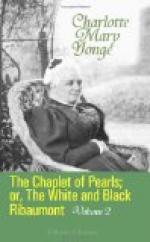Madame de Quinet, however, concluded that Eutacie had been known, or else that her jewels had betrayed her, and that the man must have been employed by her enemies. If it had not been the depth of winter, she would have provided for the persecuted lady’s immediate transmission to England; but he storms of the Bay of Biscay would have made this impossible in the state of French navigation, even if Isaac Gardon had been in a condition to move; for the first return of cold had brought back severe rheumatic pains, and with them came a shortness of breath which even the Duchess did not know to be the token of heart complaint. He was confined to his room, and it was kneeling by his bedside that Eutacie poured out her thankfulness for her child’s preservation, and her own repentance for the passing fit of self-will and petulance. The thought of Rayonette’s safety seemed absolutely to extinguish the fresh anxiety that had arisen since it had become evident that her enemies no longer supposed her dead, but were probably upon her traces. Somehow, danger had become almost a natural element to her, and having once expressed her firm resolution that nothing should separate her from her adopted father, to whom indeed her care became constantly more necessary, she seemed to occupy herself very little with the matter; she nursed him as merrily as ever, and left to him and Madame de Quinet the grave consultations as to what was to be done for her security. There was a sort of natural buoyancy about her that never realized a danger till it came, and then her spirit was roused to meet it.
CHAPTER XXXVI. SPELL AND POTION
Churl, upon thy eyes I throw
All the power this charm doth owe
MIDSUMMER
NIGHT’S DREAM
Her rival lived! The tidings could not but be communicated to Diane de Selinville, when her father set out en grande tenue to demand his niece from the Duke de Quinet. This, however, was not till spring was advancing; for the pedlar had not been able to take a direct route back to Nid-de-Merle, since his first measure had necessarily been to escape into a province where the abstraction of a Huguenot nobleman’s despatches would be considered as a meritorious action. Winter weather, and the practice of his profession likewise, delayed Ercole so much that it was nearly Easter before he brought his certain intelligence to the Chevalier, and to the lady an elixir of love, clear and coloured as crystal, and infallible as an inspirer of affection.
Should she administer it, now that she knew her cousin not to be the lawful object of affection she had so long esteemed him, but, as he persisted in considering himself, a married man? Diane had more scruples than she would have had a year before, for she had not so long watched and loved one so true and conscientious as Berenger de Ribaumont without having her perceptions elevated; but at the same time the passion of love had become intensified, both by long continuance and by resistance. She had attached herself, believing him free, and her affections could not be disentangled by learning that he was bound—rather the contrary.




